"We live with the war in our hearts, but try to keep our good life."
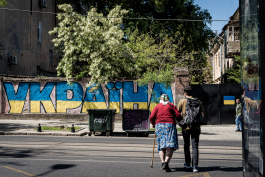
It is spring, the weather invites to be outside again, people go for a walk or drink coffee in the reopened bars. The first summer dresses can be seen on the streets of Odessa. It almost seems like a normal beginning of summer, but no one goes to the sea, because the beaches are restricted military areas. They have been mined to prevent possible landings of Russian soldiers. Sirens can be heard several times a day, warning of a possible air strike by the Russian army.
Since the beginning of the war, the people of Odessa have had to find a way to live with the constant danger- as well as with the air alarm that sounds several times a day. It starts when a missile is fired from Crimea or the Black Sea.
Where it then flies to is uncertain. The siren wailing lasts not only for a few minutes, but for several hours. A large part of the alarms remain without consequences, and many people in Odessa also stop responding to the sirens. They say that if they took every air alarm seriously, they would not be able to leave the house at all.The last time a missile hit Odessa was two weeks ago. A long time when you've been living from day to day for three months, not planning anything ahead- because what tomorrow is, whether we'll still be tomorrow, is uncertain. I caught this "we" on the streets of Odessa, between tank barricades and soldiers- life with war that has become normal.
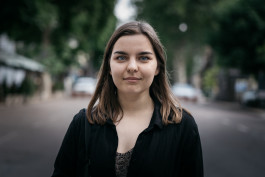
"We are positive, we go for walks, drink café, celebrate parties. We live with the war in our hearts, but try to keep our good life," Alina tells. She tries to
live in the moment and not think too much about the future, the war can go on for another three months or a whole year. She doesn't have much time to think at the moment. In addition to her work as a teacher, she now volunteers to distribute aid and ammunition in her spare time. "That helps me not to sink into bad thoughts," she says.
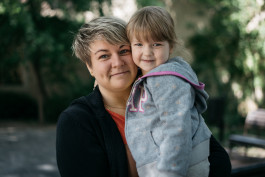
Juliana has started smoking again, there are difficult psychological ups and downs that she goes through every day. In the meantime, she can deal with it better - she now knows she has to get through the lows, and then it's getting better again. She is very afraid of the sirens. When she meets with friends, she feels uncomfortable because she doesn't know the places so well, doesn't know where to find shelter. Leaving Odessa is not an option for her: "I prefer to sleep in my own house, in my own bed."

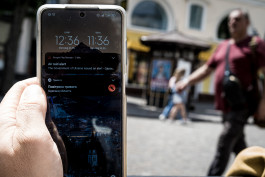
Crowded streets despite air alarms. In addition to permanently installed sirens, apps or the smartphone operator warn. To be able to sleep through the night, however, many people mute the app or even delete it.
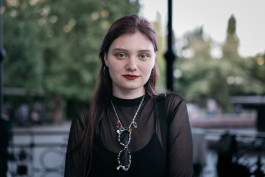
When the air raid alarm starts, Nastija closes the windows and tries to ignore the sirens. After the war began, she fled to Germany with her family. Now she is back in Odessa, the lack of her boyfriend and her cats has made her sick, she says. She has no work at the moment, she feels a bit like she is on summervacation.
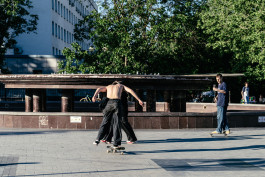
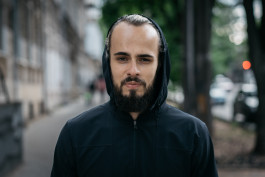
For Wadislav, not much has changed since the war began. He continues to work as a care worker. From his window he looks out over the sea. When he wanted to go for a run on the beach, he was stopped by soldiers. Because of the mines on the beach, he had to change his morning running routine
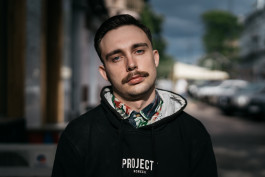
On February 24, Eugen's colleague called him early at 5 am. He was drunk, Eugen reminded him that in a few hours they would have to reopen the bar where they both worked. His colleague replied that he should turn on the TV, the bar would not open for a uncertain time. At first Eugen was very worried, he considered leaving as well. Now he has calmed down and will stay to support his country, he tells. Without a regular income, however, the financial situation in the family is becoming increasingly difficult; his mother and stepfather have also been unemployed since the beginning of the war.
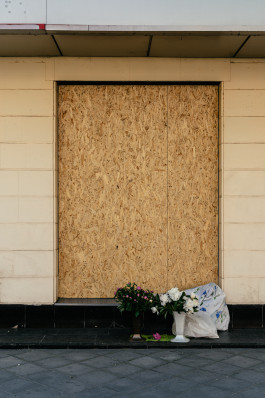
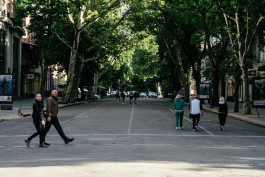
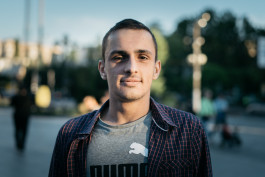
Denja is a software programmer and works online for a US company. He earns a lot of money by Ukrainian standards. He dreams of moving abroad. For now, however, that is secondary for him. Although he is not allowed to join the military due to an illness, he does not want to leave the country to defend it in case of an emergency.
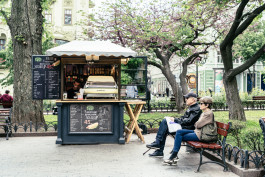
10:00 p.m., curfew begins, and the streets are abruptly empty. The patrolling soldiers are not to be trifled with, they say.
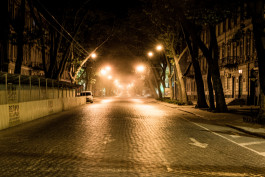
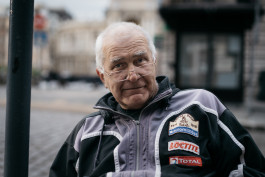
Vadim worked as a physical education teacher at a private school before the war. Now he takes care of the cats that people left behind when they fled the country. If and when the owners will come back, he does not know. That such a war is still being waged in the twenty-first century makes no sense at all to him.
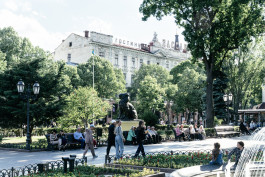

For the first two weeks of the war, Grom slept in jeans and a jacket, ready at any time to go to the air raid shelter. Since he saw the air defense taking
down missiles over Odessa, he feels safe, hardly reacting to the air alarm. Besides, he doesn't believe that Russian soldiers would go so far as to destroy the historic city center. In his free time, he plays Counter-Strike. While doing so, he also has contact with Russians. They talk about the war but they think that Putin is doing the right thing.
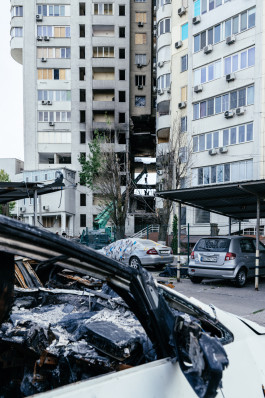
This house was hit by a rocket attack over the Easter weekend. Eight people, including a three-month-old three-month-old child died. The house is now being rebuilt.
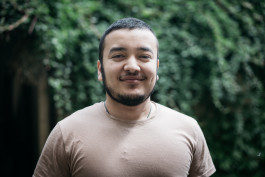
Damir has Russian and Uzbek citizenship. He lives in St. Petersburg and studies medicine there, currently he is in Odessa for a semester abroad. Until the university reopens and he gets his certificate, he cannot leave Ukraine. He is only allowed to stay in the country because of his Uzbek passport. When he speaks, his Russian accent can be heard. He often does not dare to speak to people in public. Many are suspicious of him - the fear of Russian deserters in Odessa is great.
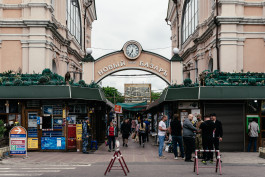
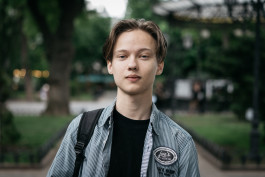
Costa has to go to school for five more years until he is a fully trained cook and can work on a fishing vessel. School has become easier since the war, all exams take place online so it is easier to cheat. Costa's close family has stayed in Odessa, which is why he doesn't want to leave the city.
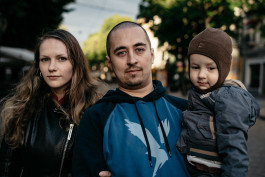
Dennis has no military training, he is not allowed to join the army, but he is also not allowed to leave the country. He can't find work as a seaman at the
moment either. On the eve of war, his ship was supposed to sail. His 3-year-old son starts shouting "alarm, alarm, we have to get to a safe place" as soon as the sirens go off. On the street, he knows not to touch anything because it could be hidden bombs. "Is this normal for such a small child?" asks Dennis.
A streetcar pulls back into the station between tank barriers just before curfew. The placard reads "Threat of Separatism?"
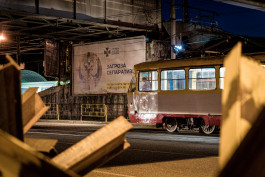
Published in Süddeutsche Zeitung Magazin
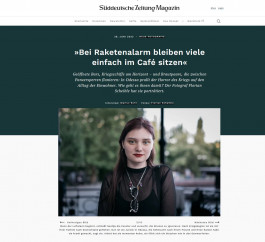
"We live with the war in our hearts, but try to keep our good life."

It is spring, the weather invites to be outside again, people go for a walk or drink coffee in the reopened bars. The first summer dresses can be seen on the streets of Odessa. It almost seems like a normal beginning of summer, but no one goes to the sea, because the beaches are restricted military areas. They have been mined to prevent possible landings of Russian soldiers. Sirens can be heard several times a day, warning of a possible air strike by the Russian army.
Since the beginning of the war, the people of Odessa have had to find a way to live with the constant danger- as well as with the air alarm that sounds several times a day. It starts when a missile is fired from Crimea or the Black Sea.
Where it then flies to is uncertain. The siren wailing lasts not only for a few minutes, but for several hours. A large part of the alarms remain without consequences, and many people in Odessa also stop responding to the sirens. They say that if they took every air alarm seriously, they would not be able to leave the house at all.The last time a missile hit Odessa was two weeks ago. A long time when you've been living from day to day for three months, not planning anything ahead- because what tomorrow is, whether we'll still be tomorrow, is uncertain. I caught this "we" on the streets of Odessa, between tank barricades and soldiers- life with war that has become normal.

"We are positive, we go for walks, drink café, celebrate parties. We live with the war in our hearts, but try to keep our good life," Alina tells. She tries to
live in the moment and not think too much about the future, the war can go on for another three months or a whole year. She doesn't have much time to think at the moment. In addition to her work as a teacher, she now volunteers to distribute aid and ammunition in her spare time. "That helps me not to sink into bad thoughts," she says.

Juliana has started smoking again, there are difficult psychological ups and downs that she goes through every day. In the meantime, she can deal with it better - she now knows she has to get through the lows, and then it's getting better again. She is very afraid of the sirens. When she meets with friends, she feels uncomfortable because she doesn't know the places so well, doesn't know where to find shelter. Leaving Odessa is not an option for her: "I prefer to sleep in my own house, in my own bed."


Crowded streets despite air alarms. In addition to permanently installed sirens, apps or the smartphone operator warn. To be able to sleep through the night, however, many people mute the app or even delete it.

When the air raid alarm starts, Nastija closes the windows and tries to ignore the sirens. After the war began, she fled to Germany with her family. Now she is back in Odessa, the lack of her boyfriend and her cats has made her sick, she says. She has no work at the moment, she feels a bit like she is on summervacation.


For Wadislav, not much has changed since the war began. He continues to work as a care worker. From his window he looks out over the sea. When he wanted to go for a run on the beach, he was stopped by soldiers. Because of the mines on the beach, he had to change his morning running routine

On February 24, Eugen's colleague called him early at 5 am. He was drunk, Eugen reminded him that in a few hours they would have to reopen the bar where they both worked. His colleague replied that he should turn on the TV, the bar would not open for a uncertain time. At first Eugen was very worried, he considered leaving as well. Now he has calmed down and will stay to support his country, he tells. Without a regular income, however, the financial situation in the family is becoming increasingly difficult; his mother and stepfather have also been unemployed since the beginning of the war.



Denja is a software programmer and works online for a US company. He earns a lot of money by Ukrainian standards. He dreams of moving abroad. For now, however, that is secondary for him. Although he is not allowed to join the military due to an illness, he does not want to leave the country to defend it in case of an emergency.

10:00 p.m., curfew begins, and the streets are abruptly empty. The patrolling soldiers are not to be trifled with, they say.


Vadim worked as a physical education teacher at a private school before the war. Now he takes care of the cats that people left behind when they fled the country. If and when the owners will come back, he does not know. That such a war is still being waged in the twenty-first century makes no sense at all to him.


For the first two weeks of the war, Grom slept in jeans and a jacket, ready at any time to go to the air raid shelter. Since he saw the air defense taking
down missiles over Odessa, he feels safe, hardly reacting to the air alarm. Besides, he doesn't believe that Russian soldiers would go so far as to destroy the historic city center. In his free time, he plays Counter-Strike. While doing so, he also has contact with Russians. They talk about the war but they think that Putin is doing the right thing.

This house was hit by a rocket attack over the Easter weekend. Eight people, including a three-month-old three-month-old child died. The house is now being rebuilt.

Damir has Russian and Uzbek citizenship. He lives in St. Petersburg and studies medicine there, currently he is in Odessa for a semester abroad. Until the university reopens and he gets his certificate, he cannot leave Ukraine. He is only allowed to stay in the country because of his Uzbek passport. When he speaks, his Russian accent can be heard. He often does not dare to speak to people in public. Many are suspicious of him - the fear of Russian deserters in Odessa is great.


Costa has to go to school for five more years until he is a fully trained cook and can work on a fishing vessel. School has become easier since the war, all exams take place online so it is easier to cheat. Costa's close family has stayed in Odessa, which is why he doesn't want to leave the city.

Dennis has no military training, he is not allowed to join the army, but he is also not allowed to leave the country. He can't find work as a seaman at the
moment either. On the eve of war, his ship was supposed to sail. His 3-year-old son starts shouting "alarm, alarm, we have to get to a safe place" as soon as the sirens go off. On the street, he knows not to touch anything because it could be hidden bombs. "Is this normal for such a small child?" asks Dennis.
A streetcar pulls back into the station between tank barriers just before curfew. The placard reads "Threat of Separatism?"

Published in Süddeutsche Zeitung Magazin
